Summer Research Experiences Steer Undergrads Toward STEM Careers
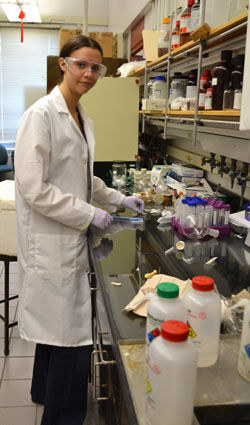
Undergraduate student Emily Rabe participates in a summer research experience at Illinois' Chemistry Life Sciences Lab.
July 27, 2012
Instead of lounging by the pool this summer, a number of undergraduate students have been in Illinois labs—not only conducting research—but possibly figuring out what they want to do for the rest of their lives.
Participants in the National Science Foundation's Research Experience for Undergraduates (REU) program, these students are experiencing what real research is like. For many of them, this experience has also exposed them to what graduate school is like. For others, this experience has confirmed their decision to pursue a career in STEM. For still others, they have discovered that they are interested in pursuing a career in the field in which they have been conducting research.
I-STEM Education Initiative Director Lizanne DeStefano sees REUs as a valuable tool in steering students toward STEM careers:
"Research experiences for undergraduates are really one of the hottest-growing areas of educational activity on our campus. I think that we see the value of bringing students into research very early in their undergraduate careers. In the chemistry climate study I-STEM conducted, we saw that students who were engaged in research, regardless of their GPAs, were more likely to declare chemistry as a major, were more likely to finish on time, and were more likely to take chemistry in graduate school or to go on to any kind of graduate education. We also think that for students who are under-represented in STEM fields, bringing them into research will help pique their interest and help them make a decision that STEM could be a potential area of study or career interest for them."
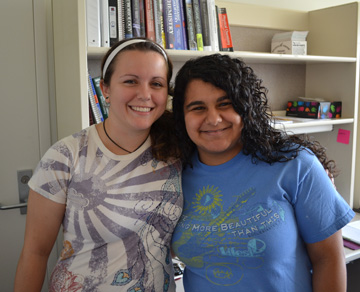
REU student Frances Venable (left) with grad student mentor Nardine Abadeer in their office at Illinois' Chemistry Life Sciences Lab.
Of the numerous REU opportunities on campus this summer, I-STEM is evaluating three: Chemistry, EBICS (Emergent Behaviors of Integrated Cellular Systems Science and Technology Center), and Nano-CEMMS (Center for Nanoscale Chemical-Electrical-Mechanical Manufacturing Systems). DeStefano believes evaluation can play a valuable role in increasing the impact of such programs: "I'm very excited to see the number of REU programs grow, and I think that by evaluating them, we can understand why they work in the ways that they do and understand how to bring them to scale on a campus of this size so that they can reach as many students as possible."
A number of REU students themselves indicated that participating in an REU has made a career in a STEM field a definite possibility.
Jennifer Rico
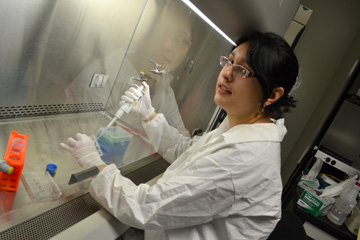
Undergraduate student Jennifer Rico works on a nanotechnology research project in Illinois' Micro and Nanotechnology Lab.
For example, Jennifer Rico from the City College of New York (CUNY), who has been working with Professor Rashid Bashir, intends to go into nanotechnology as a career and hopes to attend graduate school at Illinois and continue working with him. Rico has been looking at the differentiation of mouse embryonic stem cells to understand how these cells differentiate in the micro-environment. In New York, Jennifer has been doing research with Professor Maribel Vazquez, studying the migration of medulloblastoma cells along different growth factor concentrations. Rico ended up here at Illinois because Vazquez, who is part of the EBICS faculty, recommended that she apply because of the strength of the nanotechnology program.
While she is used to working with people of different engineering backgrounds, she appreciates the diversity and synergy of the lab here: "The experience of working in the lab and working with people of different backgrounds is the same. I know for sure that here, [of the] more than 30 people that Professor Bashir has in his lab, all of them have different backgrounds. So that's really good. You can learn from other people, from their experience, and from their technical point of view. And you all together can combine it and come to a new idea together."
Has she enjoyed the experience? She says yes: "I'm really, really enjoying this experience. I can't imagine myself being at another institution. I think this was the perfect fit for me."
Rico reports that in her freshman and sophomore years, she did not want to spend extra time doing research; however, after attending different meetings about graduate school (e.g., The National GEM Consortium for Graduate Degrees for Minorities in Engineering and Science), she decided she needed to experience it for herself, and it has changed the direction of her career plans. "Getting involved in research gave me the idea that, 'Yes, I want to do grad school,' but I didn't have that idea so strongly until I came here, and I said, 'Yes, this is what I want.'" Rico reports that working in the lab here has helped her choose the field in which she wants to work: "It has given me an idea of what I really want to do in the future…I really like nanotechnology, and I would like to continue in grad school learning new skills in the field, and then applying them to different medical and clinical applications which can have a broader impact worldwide."
Having had a couple of research experiences under her belt, Rico strongly recommends it for undergrads: "I think that we should encourage students from their lower levels in college to do research…If you want to go beyond industry and want to be the designer and builder of new ideas, then you should go to grad school, and you should start doing research before you graduate so the college that you want to apply knows that you have been exposed to different research experiences and projects."
Luis Garibay
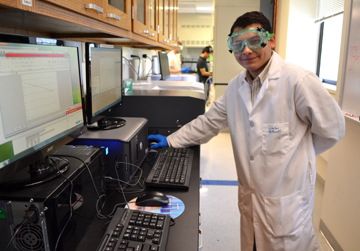
Luis Garibay studies the characteristics of cadmium selenide at the Jain Lab in Illinois' Chemistry Life Sciences Lab.
A rising senior at Andrews University in southwest Michigan, Luis is majoring in both chemistry and mathematics. In his second year participating in an REU program, Luis has enjoyed his experience at Illinois.
"It's been a good experience. It's been fun. The science that I'm doing here is very exciting. I'm happy to be here. It's a good way to learn about grad school, to go somewhere else...to get to meet people." How did he end up at Illinois? Illinois chemistry professor Ryan Bailey gave a talk at his school and encouraged him to apply. So he did.
Working with Professor Prashant Jain, Garibay has spent his summer anlyzing the catalytic properties of cadmium selenide quantum dots. The goal is to use these tiny nanoparticles to reduce a dye called resazurin. Because resazurin is soluable in water, his first task was to make quantum dots soluable in water, which he accomplished.
Garibay reports that he has grown tremendously through the experience: "Being here has confirmed my desire of going to grad school. An REU program is a great way to learn about what grad school is about, because you get hands-on experience. You're there every day spending several hours a day with grad students, the professor. I've grown so much because of REUs, because I've learned to think in a different way. I've been pushed to develop my critical thinking, and just be more creative—all those things. So its a good thing; it's a great experience, and yes, I want to go to grad school." While Luis is not sure exactly what field he is going to go into, he hopes to come to Illinois.
Fiona Weingartner
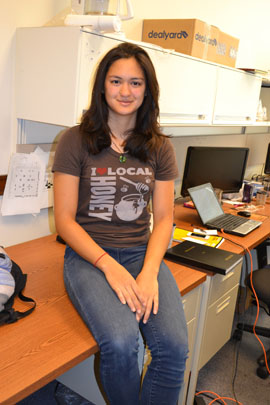
Fiona Weingartner in her office in Illinois' Chemistry Life Sciences Lab.
Another EBICS REU participant, Fiona Weingartner, is a rising sophomore in bioengineering at Illinois. Is she going to choose a career in bioengineering? Maybe. She's definitely interested in biology, was exposed somewhat to engineering when younger, but she hasn't made a firm decision. A local, she attended Campus Middle School for Girls and University Laboratory High School and has had exposure to campus labs as a youngster and high school student. However, she considers this her first "real" research experience. "It's just given me a more realistic view of what grad school would be like…It's less structured than undergrad; I didn't know what they meant until I came here." If anything, her experience has reinforced her decision to choose a STEM career. She indicates, "I always imagined that the majority of my life would be taken up with science."
Weingartner's experience has not been picture perfect. "There were many frustrations that I did not envision when accepting the job…but I know that eventually it'll still be good for me." Despite her frustrations, she recommended: "Undergraduates should get research experience."
Emily Rabe
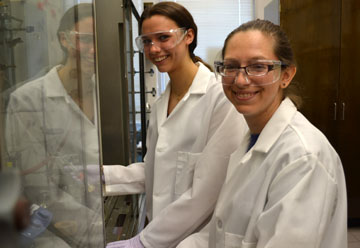
Emily Rabe and post-doc researcher Dawn Ernenwein work on HPG research.
Emily Rabe goes to school at St. Olaf, a small school in Minnesota. However, because she lives in the state of Illinois, she is familiar with the university. In fact, her brother was just accepted into the grad school in chemistry. She intends a career in chemistry, but having studied both analytical and organic chemistry, wanted to get the research experience to help her choose between the two disciplines. Rabe reports that she has really enjoyed this summer, which was her first research experience. It has shown her what graduate school is like, confirmed the fact that she wants to go to grad school, and given her some ideas of what she wants to look for in a school. Says Rabe: "It's been great."
In her research experience, Rabe has helped with experiments which involve making two different functionalized HPGs (hyperbranched polyglycerols) which the Mayo Clinic can then use for drug delivery in treating certain diseases. Because the researcher with whom she has been working is new, Emily reports, "I was very lucky that she's new, so she actually is still trying to figure out her project, so I got to actually take part in that, and figuring out the research and hearing about all of the development of the ideas, which is really fun, and I really enjoyed that."
Frances Venable
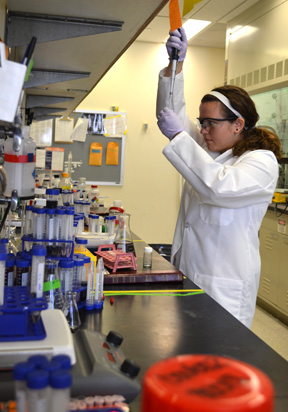
Frances Venable conducting research on gold nanoparticles in Catherine Murphy's lab on campus.
Frances Venable, who hails from Park University, a 1500-student school in Kansas City, Missouri, participated in the Chemistry REU this summer. The SIU researcher with whom she worked last summer advised her to apply to the REU at Illinois, where she hopes to attend graduate school: "It's been wonderful. I love the research, and I love the school." Currently researching gold nanoparticles with Dr. Catherine Murphy, she definitely wants to continue working in nanotechnology in Murphy's lab, if she is accepted.
Venable has found the relationships she has developed with the graduate students to be especially helpful: "It's been especially nice working with Nardin, because aside from guiding me in research, she also gives a lot of good advice for graduate school, trying to guide me in that aspect as well, as far as what to look for when applying, fellowships to apply for, and things like that.
Alaina Engdahl
Alaina Engdahl is a rising senior studying at Wittenberg University, a small school in Ohio. She actually found about Illinois' Chemistry REU via NSF's website, which lists all of the REU programs. She applied to four. Because of the reputation of Illinois' chemistry program and because it was in the Midwest, Illinois' REU was her top pick; as fate would have it, Illinois responded first. She has spent the summer doing theoretical research on recoupled pair bonding theory. Despite sitting at a computer running calculations rather than being in a lab mixing chemicals, she has enjoyed the experience.
Engdahl intends to study either chemistry or biology; she's done research in the past and has liked all of what she's done so far. This summer's experience has confirmed that this could also be a possible career. Besides this summer's research experience, she participated in research the summer after her freshman and sophomore years as well. How did she get involved in research? At the urging of her advisor, who said, "If you want to go to grad school, the more research you have under your belt, the better."
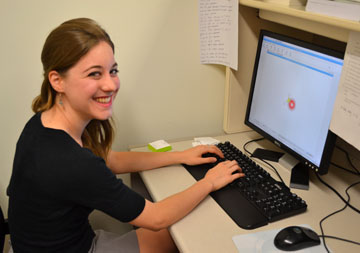
Alaina Engdahl runs calculations on recoupled pair bonding.
How has this experience been different than at her own school? "The main difference is that there are actually graduate programs here. Wittenberg University only has a graduate program in education…so there are no research groups or research labs, so this is a completely different experience. And that's another one of the reasons that applying to these REU programs is so important. Because if I'm going to grad school, I need to realize, 'Oh, this is what working in a graduate lab is like,' because I can't get that at my home university."
Author/Photographer: Elizabeth Innes, Communications Specialist, I-STEM Education Initiative
More: REU, REU: Chemistry, REU: EBICS, REU: nano@illinois, Summer Research, Undergrad, 2012













.jpg)
















